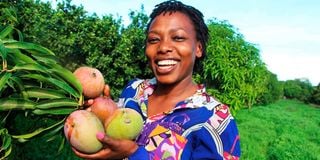Small-holder farmers facing constrained access to credit

Petronilla Muthama harvests mangoes at her farm in Kathiani Village in Makueni County on December 6, 2022.
Small-holder farmers in Kenya remain deprived of much-need credit despite agriculture being an economic mainstay, findings by a World Bank study say.
A paltry one percent of credit supply gets to the farmers hard-hit by the negative effects of climate change, according to the study. The constrained access to credit can be attributed to several factors, which include a lack of collateral to secure financing, high transaction costs for providing financial services to rural areas, as well as the high cost of credit, which discourages farmers from seeking credit.
“The African start-up ecosystem is largely fragmented in terms of knowledge and data sharing. One thing African economies could learn from developed countries such as South Korea and Israel, is that knowledge sharing done across the different models in their agricultural ecosystems can help to simplify a lot of business processes,” noted Teymour Dajani, an associate investment officer, at the International Finance Corporation. Speaking during an Africa-Korea Agtech Innovation summit held recently in Nairobi, the official noted that there is a need for large financial institutions to work closely with smaller lending institutions to facilitate improved access to credit for small-holder farmers.
Crop production
Lack of access to credit has significantly affected crop production, as farmers have been unable to buy key inputs such as seeds, fertiliser, and pesticides. Lack of access to credit has also prevented farmers from accessing disruptive agricultural technologies that can enable them to mechanise their operations and improve their yields and incomes. These technologies range from mobile apps to digital identities for farmers, solar applications for agriculture, portable agriculture devices, and bio-fortified foods.
“Despite Kenya being the digital innovation hub of Africa and home to many of the continent’s innovative startups on digital agriculture, many of Kenya’s farmers have yet to benefit. As a result, crop yields and livestock productivity in Sub-Saharan Africa are not rising fast enough to meet growing food demand,” noted Patrick Sampao, a tech consultant who spoke during the summit.
Digital technologies
He called on the government to design and implement policies that promote use of digital technologies in agriculture value chains. These include policies that will make the use of ICT devices and the internet more affordable so that smallholder farmers can easily access some of the services and information provided by innovative start-ups, that simplify processes.
“Though Kenya, and Africa at large, has a substantial amount of arable land, a large portion of the food that is consumed locally is imported. Technologies such as mobile apps, data analytics, and digital extension can be used to improve farmers’ yields if deployed and scaled effectively and dramatically,” noted Sampao. On a larger scale, new technologies can be deployed to help mitigate climate change, fight pests and diseases, and by extension boost mass production of food
“Many smallholders in Sub-Saharan Africa sell their produce to the local community or to intermediaries since they lack information and connections to alternative buyers who could give them better prices and conditions,” noted Sampao.





